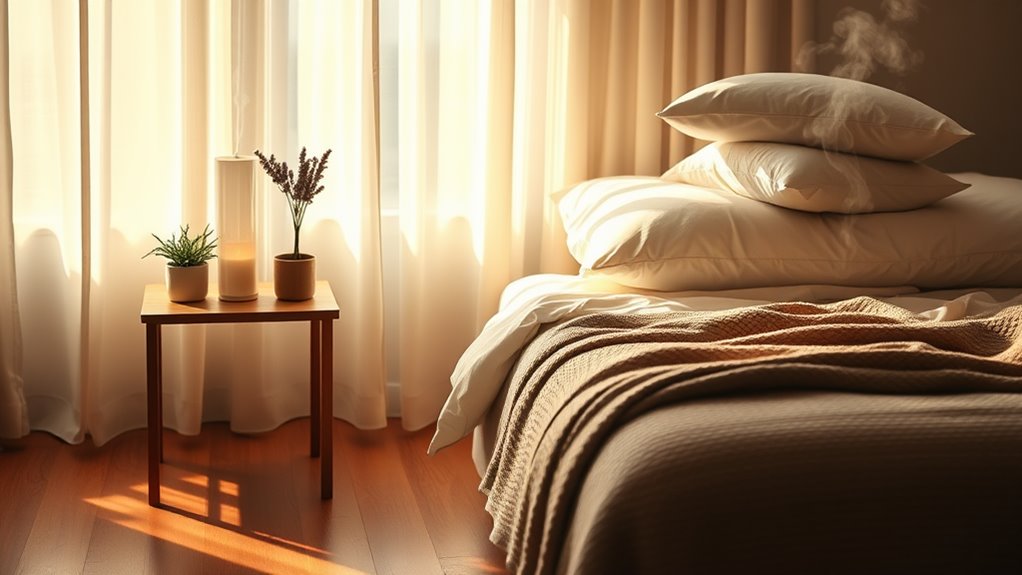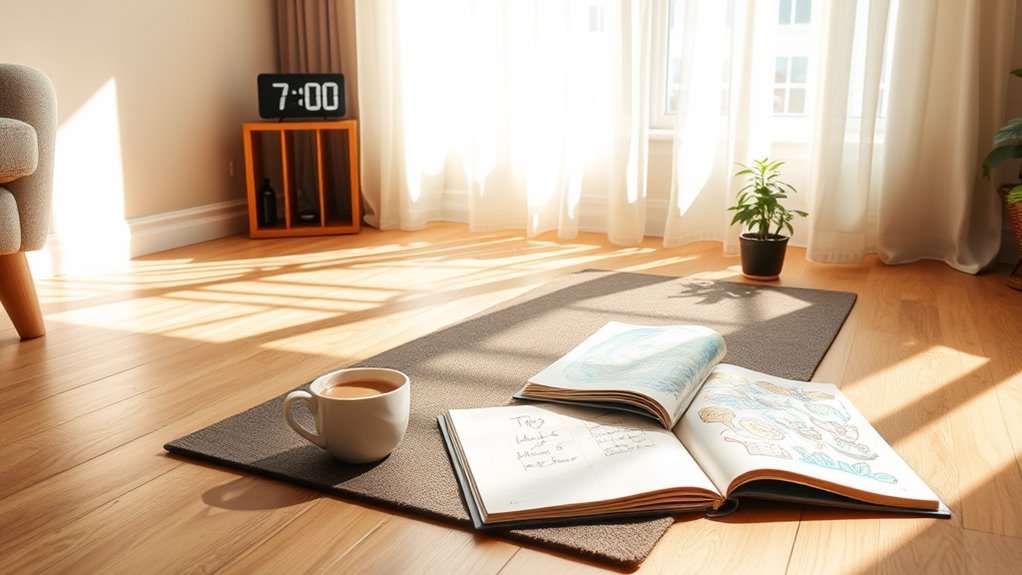The Best Tips for a Deep, Restful Sleep Every Night
To enjoy a deep, restful sleep every night, stick to a consistent sleep schedule and create a calming bedtime routine. Optimize your sleep environment by controlling light and temperature. Limit screen time at least 30 minutes before bed and pay attention to your diet by avoiding heavy meals and caffeine. Incorporate relaxation techniques like gentle stretching or meditation, and stay active during the day. There’s more to explore that can enhance your nightly rest further.
Key Takeaways
- Maintain a consistent sleep schedule by sleeping and waking at the same time daily to regulate your body’s internal clock.
- Create a relaxing bedtime routine with activities like reading, gentle stretching, or meditation to signal your body it’s time to sleep.
- Engage in at least 30 minutes of moderate exercise during the day to enhance sleep quality and reduce stress levels.
- Limit caffeine, nicotine, and heavy meals in the evening to avoid disruptions in your sleep cycle and promote restful sleep.
- Optimize your sleep environment by keeping the room cool, dark, and quiet, using breathable bedding, and incorporating calming scents like lavender.
Establish a Consistent Sleep Schedule
To improve your sleep quality, it’s essential to establish a consistent sleep schedule. By going to bed and waking up at the same time daily, you’ll train your body’s internal clock, leading to better sleep.
Start by determining your ideal sleep duration—most adults thrive on 7-9 hours. Once you’ve set a target, make gradual adjustments if necessary, shifting your bedtime by 15-30 minutes until you reach your goal.
Avoid sleeping in on weekends, as this can disrupt your rhythm. Consistency is key; even minor variations can throw you off. Additionally, prioritizing sleep is crucial for overall quality of life, as it impacts both physical health and mental well-being.
Create a Relaxing Bedtime Routine
To create a relaxing bedtime routine, start by limiting screen time in the hour before bed. Incorporate relaxation techniques like deep breathing or gentle stretching to help signal your body that it’s time to wind down. Additionally, consider adopting a simple evening routine to enhance relaxation, which can further improve your sleep quality.
Limit Screen Time
While winding down for the night, limiting screen time can greatly enhance your sleep quality. When you step away from devices, you allow your mind to enter a more restful state. Aim for at least 30 minutes of screen-free time before bed. Instead of scrolling, consider reading a book or practicing mindfulness. This shift fosters a tranquil environment conducive to sleep. Incorporating a relaxing bedtime routine can further help signal your body that it’s time to wind down.
Here’s a visual guide for your bedtime routine:
| Activity | Duration | Purpose |
|---|---|---|
| Dim the lights | 10 minutes | Signal your body to relax |
| Read a book | 20 minutes | Engage your mind gently |
| Take a warm bath | 15 minutes | Soothe your muscles |
| Meditate or journal | 15 minutes | Clear your mind |
Incorporate Relaxation Techniques
Creating a relaxing bedtime routine is essential for promoting deep, restful sleep. Start by setting aside at least 30 minutes to wind down.
Engage in calming activities like reading a book, practicing meditation, or taking a warm bath. These actions signal your body that it’s time to relax. You might also consider gentle stretches to release tension held in your muscles.
Dim the lights to create a soothing atmosphere and limit stimulating activities. Incorporate calming scents, like lavender, to enhance your environment. Additionally, adopting simple nighttime rituals can significantly transform your sleep experience by establishing a consistent pattern that your body recognizes.
As you consistently follow this routine, your body will begin to associate these activities with sleep, making it easier to drift off.
Prioritize these moments of tranquility to cultivate a restorative sleep experience.
Consistent Sleep Schedule
Establishing a consistent sleep schedule can greatly improve your sleep quality. By going to bed and waking up at the same time daily, you train your body’s internal clock, enhancing your ability to fall asleep and wake refreshed.
To create a relaxing bedtime routine, start winding down an hour before sleep. Dim the lights, turn off screens, and engage in calming activities like reading or meditating.
Limit caffeine and heavy meals close to bedtime, as they disrupt your natural rhythm. Consistency is key; even on weekends, stick to your schedule to reinforce your body’s sleep-wake cycle.
Additionally, transforming your sleep can be achieved by establishing a soothing bedtime routine, which helps signal your body that it’s time to unwind.
With dedication, you’ll master the art of restful sleep, transforming your nights into a sanctuary for rejuvenation and energy.
Optimize Your Sleep Environment
To get the best sleep possible, you need to optimize your sleep environment.
Start by controlling light levels and adjusting the room temperature to your comfort.
These small changes can make a big difference in how well you rest each night.
Control Light Levels
While you might not realize it, controlling light levels in your sleep environment plays an essential role in achieving deep, restful sleep. Darkness signals your body to produce melatonin, which promotes sleepiness. To optimize your space, consider the following strategies:
| Light Source | Recommendation | Effect on Sleep |
|---|---|---|
| Natural Light | Use blackout curtains | Reduces morning light exposure |
| Artificial Light | Dim lights before bed | Prepares your body for sleep |
| Electronics | Turn off screens an hour prior | Lowers blue light interference |
Adjust Room Temperature
After ensuring your sleep environment is dark, it’s time to focus on room temperature, which greatly impacts sleep quality.
Aim for a cool setting, ideally between 60 to 67 degrees Fahrenheit. This range helps lower your body temperature, signaling it’s time to sleep. If you’re too warm, your body might struggle to enter deeper sleep stages, leading to restlessness.
Conversely, being too cold can disrupt your comfort and wake you up. Use breathable bedding and pajamas to help regulate your temperature. If needed, consider a fan or air conditioner for added control.
Limit Screen Time Before Bed
Limiting screen time before bed is essential for achieving deep, restful sleep. The blue light emitted by screens interferes with your melatonin production, making it harder to fall asleep. Aim to disconnect at least an hour before bedtime.
Here’s a quick overview of screen time impacts:
| Time Before Bed | Activity | Impact on Sleep |
|---|---|---|
| 1 hour | No screens | Ideal sleep quality |
| 30 minutes | Reading a book | Calming, promotes sleep |
| 15 minutes | Mindfulness practice | Reduces anxiety, improves focus |
| 0 minutes | Watching TV | Disrupts sleep cycles |
Pay Attention to Your Diet
What you eat can greatly influence the quality of your sleep, so it’s vital to pay attention to your diet.
Avoid heavy meals close to bedtime; they can lead to discomfort and restlessness. Instead, opt for lighter snacks that include sleep-promoting ingredients, like almonds, bananas, or oatmeal.
Limit caffeine and nicotine, especially in the afternoon and evening, as they can disrupt your ability to fall asleep. Alcohol might seem to help you drift off initially, but it often interferes with deeper sleep stages.
Hydration is important, but try to reduce fluid intake before bed to minimize nighttime awakenings.
Incorporate Relaxation Techniques
To enhance your sleep quality, incorporating relaxation techniques into your nightly routine can make a significant difference.
Start with deep breathing exercises; inhale slowly through your nose, hold for a moment, and exhale through your mouth. This simple practice calms your mind and body.
You might also consider progressive muscle relaxation, where you tense and then relax each muscle group, promoting physical release.
Meditation or mindfulness can help focus your thoughts and reduce anxiety, making it easier to drift off.
Aromatherapy with calming scents like lavender can enhance your environment.
Finally, gentle stretching or yoga can relax your body and signal that it’s time to sleep.
Stay Active During the Day
Staying active during the day is essential if you want to improve your sleep quality at night. Engaging in regular physical activity boosts your energy levels and reduces stress, both of which contribute to deeper sleep.
Aim for at least 30 minutes of moderate exercise daily—whether it’s brisk walking, cycling, or yoga. This not only helps you fall asleep faster but also enhances your sleep’s restorative phases.
Try to schedule your workouts earlier in the day; exercising too close to bedtime can stimulate your body and disrupt your ability to wind down.
Remember, consistency is key. Establishing a daily routine keeps your body in sync, helping you master the art of restful sleep each night.
Prioritize movement, and reap the benefits come bedtime.
Frequently Asked Questions
How Long Does It Take to Adjust to a New Sleep Schedule?
Adjusting to a new sleep schedule can feel challenging, yet it’s achievable. Typically, it takes about one to two weeks for your body to adapt, but individual experiences may vary based on consistency and lifestyle changes.
Can Naps During the Day Affect Nighttime Sleep Quality?
Yes, naps can affect your nighttime sleep quality. If you nap too long or too late in the day, it might interfere with your ability to fall asleep later, disrupting your sleep cycle.
What Should I Do if I Can’t Fall Asleep?
If you find yourself tossing in a sea of restless thoughts, try focusing on your breath. Inhale deeply, envisioning calm waves, and exhale tension. Create a serene space to nurture your mind; embrace stillness.
Are Sleep Supplements Safe for Long-Term Use?
Sleep supplements can be safe for long-term use, but they’re not one-size-fits-all. You should consult your healthcare provider to discuss potential risks and find the right balance for your individual needs and circumstances.
How Do Stress and Anxiety Impact Sleep?
Stress and anxiety disrupt your sleep cycle, making it hard to fall or stay asleep. They trigger heightened alertness, racing thoughts, and physical tension, all of which prevent you from achieving restorative, deep sleep.





